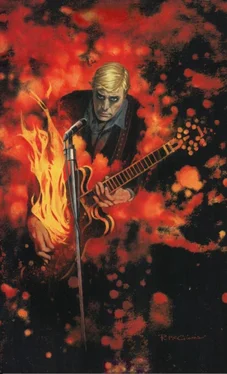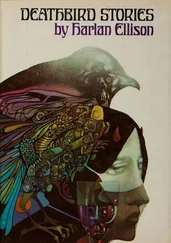Chilled clean through.
Empty of everything but fear.
Unable to answer but trapped by eyes dark as pencil points. Was this the way it felt to know you could destroy the world with the flick of a finger?
He heard himself talking…
“Listen, kid, I think you’ve got it better than before. Sure, I’ll give you that break, Stag. I’ve got to make it now, but I won’t leave town till I talk to you again. You just wait, kid, you just wait…”
You just hold your breath.
You just sit and stare.
You just keep cool, I’ll be back.
And somehow, he was getting out of there. Somehow he was getting out of the line of those two radiating beams of black light from Stag Preston’s eyes. Somehow he was stumbling over chairs in his rush, and ducking under the velvet cord before Mario could unhook it. Somehow he was out into the cool and humid and sweaty neoned street, striding quickly away and around a corner and down a block and around two more fast corners in case he was being followed for more words, more glances, more pressure.
Finally, on a side street in New Orleans, down in an eddy in the swamp of life, Shelly Morgenstern stopped, and leaned against a building, and drew in breath raggedly. He pulled out a cigarette and his lighter, and joined them the way they had been intended.
He moved away from the building, under a street light, alone in the darkness surrounding that baleful spot of brilliance, and he pulled at the cigarette. It had not been as clean and neat and finished as he had thought. Life wasn’t like that. You ran into people again. You saw them straight up, singing, healed, the eyes dark and the hollows in the cheeks, and you knew they weren’t finished; that with the right touch, with the shove you could give them, with the power you could put in their hands, you could turn them on again, like a robot, ready to tear into the scene and start gnawing at people’s throats.
It could be done.
The power, the way, the method was there. If you wanted to do it.
Shelly Morgenstern stared up at the night sky of New Orleans, this last whirling eddy in the swamp that Stag Preston had made of his life, and the lives of too many others. Too many. And Shelly Morgenstern came to a very bitter, very brutal, very simple conclusion:
There are those people in this world who were born for evil. They never bring any real happiness to anyone; they can only cause misery, heartache and trouble. The Hitlers, the
Capones, the little people with a touch of rot about them. Everyone knows someone like that. But few of them have any range and power; they’re limited. What if they get loose, gain status?
He drew deeply on his cigarette, and the glowing tip of it was like Stag Preston, back in the sleazy strip joint, glowing, waiting to be thrown into dry brush, to start the fire all over again, to burn out good ground and good crop and good timber. It was that easy.
He realized, quite clearly, that just as once before, when he had turned Stag Preston loose on the world, he was perhaps the only person who had the power to do it again. Few people would listen to a scarred guy singing in a low dive, and the chance of anyone with influence crossing the singer’s path again … well, it could happen, but that was art, fiction, not life. No. Stag was here to stay, unless … unless Shelly set him loose again.
All it would take would be that one little favor, that one little push, that one little nudge and break.
That’s all it would take.
“Sure, Stag,” he said to no one at all, “sure, I’ll give you a break. I’ll give us all a break. You can count on it, baby.” He took one last puff on the cigarette—the cigarette seemingly so harmless, like Stag Preston, but capable of cancer—and flipped it into the gutter. It landed with a shower of sparks, and Shelly walked away into the night, looking for a hot bowl of gumbo, leaving the cigarette butt and Stag Preston behind, to sink forever out of sight, each in its own gutter … harmlessly.
The End












